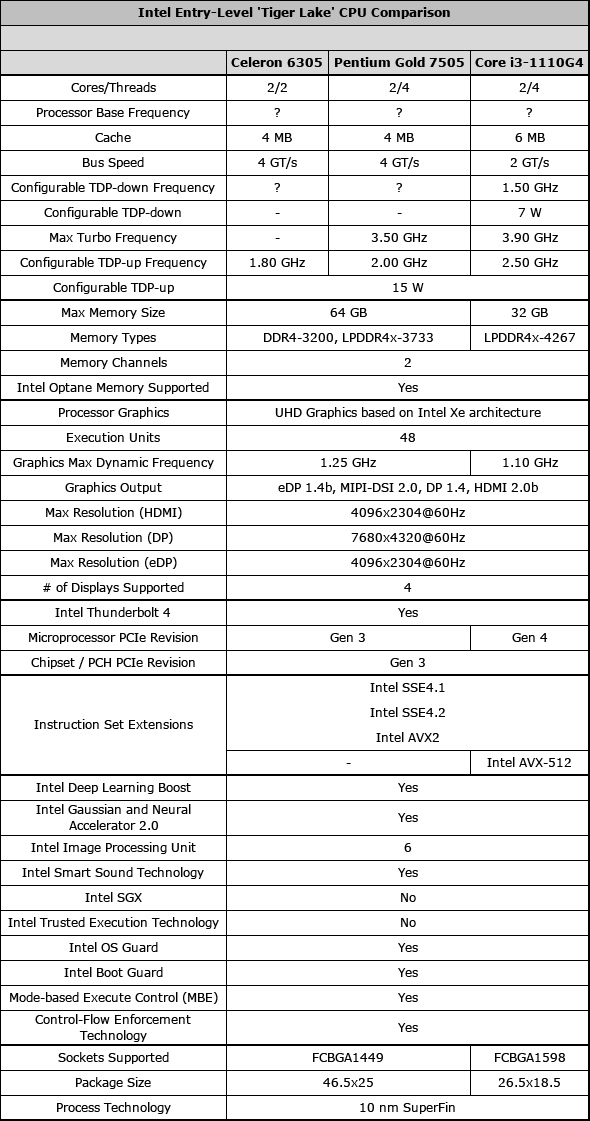Intel’s Latest Celeron and Pentium CPUs Finally Get AVX2, AVX-512 Support
Tiget Lake-based Celerons and Pentiums get almost same feature set as Core parts
Get Tom's Hardware's best news and in-depth reviews, straight to your inbox.
You are now subscribed
Your newsletter sign-up was successful
Intel's latest Celeron and Pentium Gold processors for laptops based on the Tiger Lake microarchitecture apparently support most technologies featured by more expensive 11th Generation Core i-series parts. Most notably, they support AVX2 extensions and even an AVX-512 instruction.
Intel's Celeron and Pentium Gold processors for entry-level laptops are usually based around the same high-performance cores as their more expensive Core counterparts that belong to the same generation of CPUs. To differentiate between more advanced Core and cheaper Celeron and Pentium Gold parts, Intel used to disable numerous features on the latter, slowing them down in certain demanding applications and causing headaches for software developers, as well as frustration among end-users. As it turns out, Intel changes this practice rather significantly with its Tiger Lake-based Celeron 6305/6305E and Pentium Gold 7505 processors.
The new Celeron 6305 and Pentium Gold 7505 CPUs are dual-core processors (with or without Hyper-Threading) with a configurable TDP-up frequency of 1.80 GHz and 2.0 GHz (respectively), 4 MB cache, UHD Graphics based on the Xe-LP architecture with 48 execution units, and a dual-channel memory controller that supports DDR4-3200 as well as LPDDR4X-3733 memory.
Unlike previous-generation Celeron and Pentium Gold processors for notebooks (and embedded applications in case of the model 6305E), these CPUs support AVX2 instructions, the Intel Deep Learning Boost technology (using the AVX512-VNNI instruction), as well as the Intel Gaussian and Neural Accelerator 2.0, the same 'premium' features supported by more expensive Tiger Lake processors. Meanwhile, enabling support for AVX2 and the AVX512-VNNI instructions is not particularly surprising given that Intel's upcoming low-power Gracemont cores will support AVX2 as well sometimes next year.
Surprisingly, Intel's Celeron 6305 and Pentium Gold 7505 CPUs also feature Intel's Xe-LP GPU with 48 EUs. That means that they offer significantly more graphics horsepower than Intel's Core i7 chips with Iris Pro that the company released several years ago, and support up to four displays. Furthermore, the processors feature Thunderbolt 4 connectivity, another premium capabilities for entry-level notebooks. Last but not least, the Pentium Gold 7505 also supports Turbo Boost 2.0 up to 3.50 GHz, a first in the lineup's history.
There are still differentiating features between the Core i3-1110G4 and the Celeron 6305 and Pentium Gold 7505. The Core i3 part is clocked considerably higher, has a larger 6 MB cache, supports LPDDR4X-4267 memory, features a PCIe Gen 4 interface, and supports configurable TDP-down in a bid to address sleeker laptops.
In fact, the Core i3-1110G4 is designed for compact, low-power machines and even comes in a smaller package. Intel’s Core-branded Tiger Lake chips support more AVX-512 instructions and, therefore, offer higher performance in certain applications that use them.
Get Tom's Hardware's best news and in-depth reviews, straight to your inbox.
It remains to be seen whether Intel adopts the same approach with its upcoming desktop Celeron and Pentium-branded processors and enables AVX2 and Deep Learning Boost. But at least the company is doing it with mobile parts.

Anton Shilov is a contributing writer at Tom’s Hardware. Over the past couple of decades, he has covered everything from CPUs and GPUs to supercomputers and from modern process technologies and latest fab tools to high-tech industry trends.
-
linuxdude Finally - Intel is lowering prices and reduces feature-cutting of entry-level parts.Reply
Thank you AMD for the renewed competition, 2012-2017 were rather boring 5 years ;) -
JfromNucleon Reply
Definitely, no matter whose winning, the consumer is truly the winner in competitionlinuxdude said:Finally - Intel is lowering prices and reduces feature-cutting of entry-level parts.
Thank you AMD for the renewed competition, 2012-2017 were rather boring 5 years ;) -
Phaaze88 And this is not long after that one game closed off Celeron and Pentium options because the engine was updated to support AVX.Reply
What was it again? It had something to do with space, and spaceships...
It's been in beta status with no signs of 'going gold' anytime soon...
Star Citizen! Yeah, that one.
